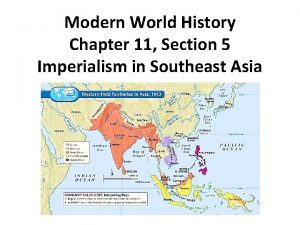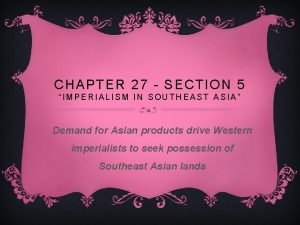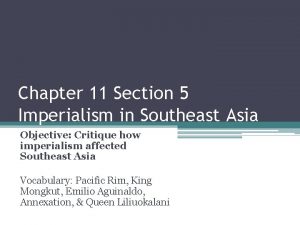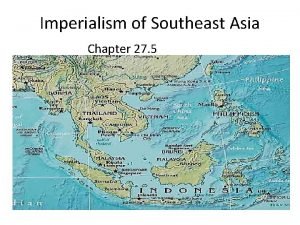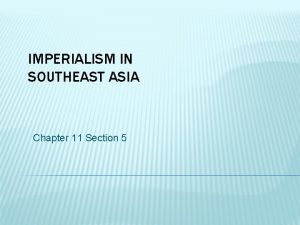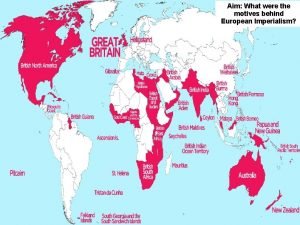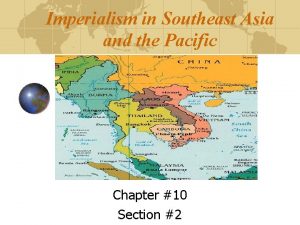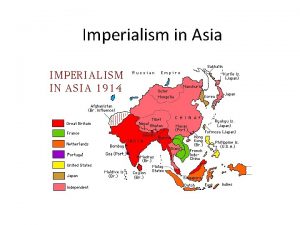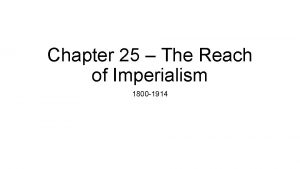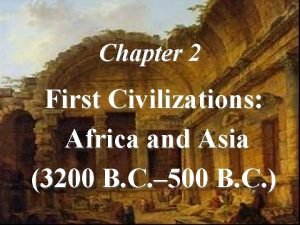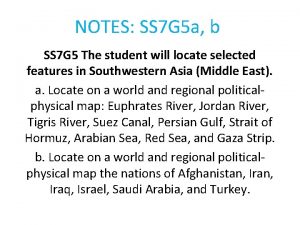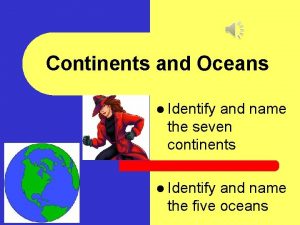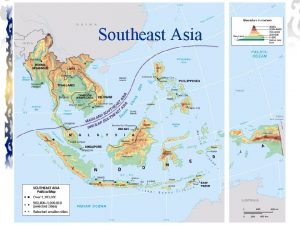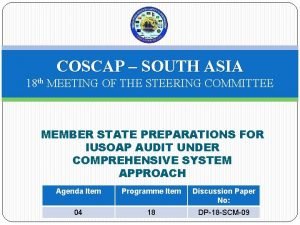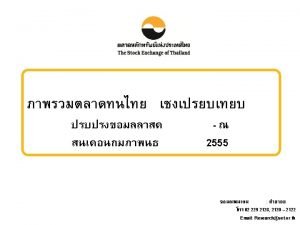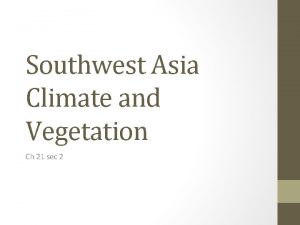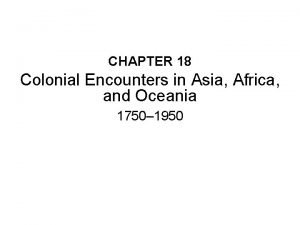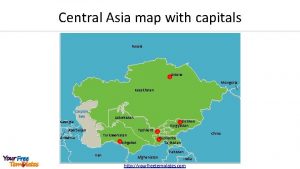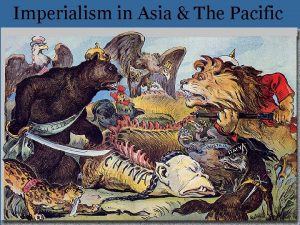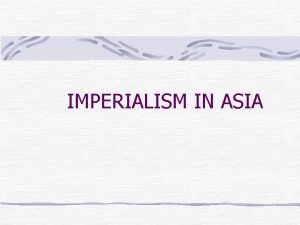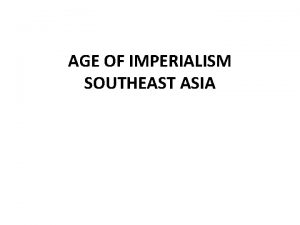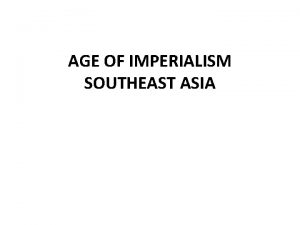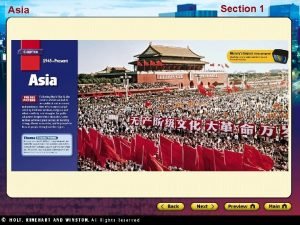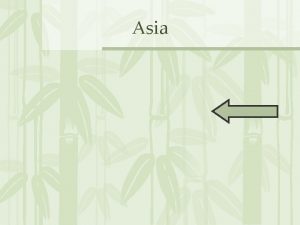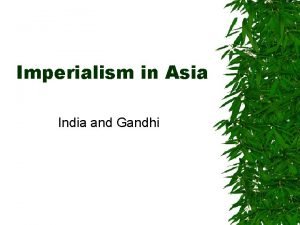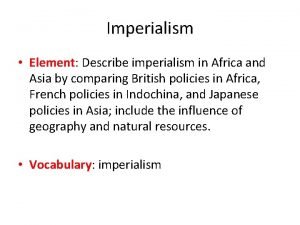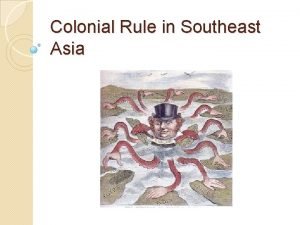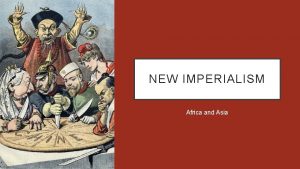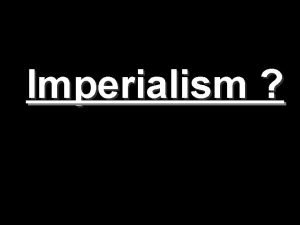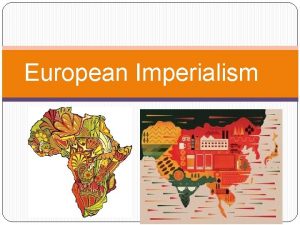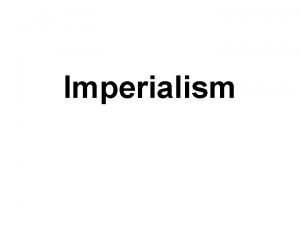IMPERIALISM IN ASIA WARM UP IMPERIALISM What Imperialism
































- Slides: 32

IMPERIALISM IN ASIA

WARM UP

IMPERIALISM What: � Imperialism - a policy in which a strong nation seeks to dominate other countries politically, economically, or socially Before most European countries had little interest in acquiring or conquering territory outside of their country – rather most built a series of trading stations or ports (Except for Spain in the Americas and Portugal in Brazil) Then everything changed and it was followed by an explosion of territorial conquest and large areas reorganized into dependent regions to be used for raw materials and market to sell manufactured goods Between 1815 -1914 the West (Europe and America) increased their control of the world’s land mass from 35% to 85%


IMPERIALISM Who: Britain, Belgium, France, Germany, Italy, Netherlands, Portugal, Spain, United States and Japan Where: Asia, Africa and the Middle East When: 19 th and 20 th century or 1800 s – 1950 s

IMPERIALISM Why: Causes of Imperialism � 1) Industrial Revolution increased the need for natural and raw materials � 2) New markets to sell European finished (manufactured) goods to make money � 3) Nationalism or pride in your country – more colonies equals more power and money

IMPERIALISM Why: Causes of Imperialism 4) Social Superiority � Belief that one race is superior to another – racism � Social Darwinism - the application of Charles Darwin’s ideas about evolution and “survival of the fittest” to human societies—particularly as justification for imperialist expansion Right and duty to bring progress, improve and civilize other nations To spread Christianity and Western culture (European and American culture) to others - ethnocentrism � Assimilation - 1. the adoption of a conqueror’s culture by a conquered people. 2. a policy in which a nation forces or encourages a subject people to adopt its institutions and customs �

IMPERIALISM Why: Causes of Imperialism 5) New technologies and military advantages like Steampowered gunboats, repeating rifles, machines guns, exploding shells (artillery) 6) Weakening Empires � Great empires of Asia, Africa were weakening; Europeans took advantage � India’s Mughal Empire steadily declined after 1707 � Ottoman Empire lost strength had weak grasp on North African provinces throughout the 1700 s � China’s Qing dynasty faced rebellions; by late 1700 s European armies faced limited resistance as they claimed new territories 7) Military and naval bases 8) Places for unwanted and excess population

FORMS OF IMPERIALISM

FORMS OF IMPERIALISM

WATCH: CRASH COURSE (WORLD HISTORY) THOUGH BUBBLE #35 -IMPERIALISM https: //www. filepicker. io/api/file/E 0 Gsm. Ues. Rw 6 G 0 F vm. Ke. QM


BRITISH IMPERIALISM IN INDIA India had a large population and an abundance of natural resources like cotton, tea, indigo, and jute During the late 1600 s and 1700 s, the British East India Company was able to establish trading post in India After the decline of the Mughal Empire in India, the British East India Company was able to gain more land � Began to use native Indian soldiers, or Sepoys, in the British East Indian Company army

BRITISH IMPERIALISM IN INDIA Brought about many positive changes: � Built roads, railroads, telephone and telegram lines, dams, bridges, canals and factories � Infrastructure - the basic equipment and structures (such as roads and bridges) that are needed for a country, region, or organization to function properly � Improved sanitation, public health, and built schools � Christian missionaries spread religion and converted Indians

BRITISH IMPERIALISM IN INDIA Problems with British Imperialism: � Many Indians thought that the British wanted to destroy the society and culture in India � Banned the Hindu practice of Sati High taxes imposed on Indian to pay for the government and infrastructure Indians had little influence on government and the best and highest paid jobs were reserved for the British Destroyed India’s industry – less jobs and money for India � Forced many farmers to grow cash crops – less food to feed India � Segregated neighborhoods and established exclusive clubs for British only �

BRITISH IMPERIALISM IN INDIA Sepoy Mutiny In 1857 a rebellion broke out in India, which lasted a year � British introduced a new rifle that required a new type of ammunition greased with beef and pork fat � � Eventually the rebellion is put down � Hindus do not eat beef and Muslims do not eat pork Failed because Muslim and Hindu Sepoys did not trust each other British government ended the rule of the British East India Company in 1858

BRITISH IMPERIALISM IN INDIA Established the British Raj or strict British rule (direct rule) which will last until 1947 � India remained a major supplier of raw materials for the British and a large market of British manufacture goods for Britain “Jewel in the Crown” � For Indians, British imperialism was a source of frustration and humiliation which gave rise to powerful feeling of nationalism Groups like the Indian National Congress and the Muslim League began calling for self-government

WATCH “THE CAVE” BY MUMFORD AND SONS How is British Imperialism in India similar to the song “The Cave” by Mumford & Sons? https: //www. filepicker. io/api/file/z. Bt. Wpu. Pu. RF 2 tz. NMhu. GWy

IMPERIALISM IN CHINA During the late 1700 s, China was ruled by the Qing dynasty Had a strong farming economy based on growing rice and other crops such as peanuts and tea The Chinese made silk, cotton, and ceramics and Chinese mines produced salt, tin, silver and iron China needed nothing from the outside world and wanted little contact with European merchants � Limited trade to one city (Guangzhou) Huge demand for tea in Britain and the Chinese wanted silver for it – this was a problem for the British � Solution was to sell opium from India to Chinese

IMPERIALISM IN CHINA The Opium Wars British military technology overpowered Chinese European nations won extraterritorial rights and the right to trade in five ports Extraterritorial Rights - an exemption of foreign residents from the laws of a country Chinese resented the treaties but could not stop them

IMPERIALISM IN CHINA European Countries Establish Spheres of Influence in China � China and the Qing dynasty further weakened by poor harvest, a civil war, and a corrupt government 20 million people die in 14 years European nations take advantage of the problems and weakness in China � Establish Spheres of Influence during the late 1800 s Spheres of Influence - a foreign region in which a nation has control over trade and other economic activities Many begin to called for the end of the Qing dynasty


IMPERIALISM IN CHINA Boxer Rebellion (1899 -1901) � Boxers or the Society of the Righteous and Harmonious fists Believed they were invulnerable to Western weapons and rebelled against foreign control � First attached missionaries then laid siege to Beijing � European nations too powerful for Boxers and the rebellion was put down � Chinese eventually would end the Qing Dynasty in 1911, but would still be under the control of foreign countries until the mid-1900 s

WATCH: BOXER REBELLION – 3 MINUTE HISTORY https: //www. filepicker. io/api/file/Ur. UCT 5 vs. Sv 2 h. Ks. PI 7 bij

JAPANESE IMPERIALISM From 1603 to 1868, Japan was ruled by the Tokugawa Shogunate (Edo period) Resisted contact from foreign countries at first Commodore Matthew Perry sent by U. S. president, Millard Fillmore, with warships to Japan in 1853 Convince Japan to sign the Treaty of Kanagawa, which allowed the U. S. trade in two Japanese ports (5 more by 1858) Humiliating treaties contributed to the rise of Japanese nationalism

JAPANESE IMPERIALISM The Meiji Restoration � In the Tokugawa Shogunate – emperor had been little more than a symbol of power � Real power was with the Shogun, supreme military ruler � Many resented the way the Shogun had given into Western demands � Shogun was forced to step down, which ended military control of Japanese government � 1868 – Emperor Mutsuhito took back power of government – took the name of Emperor Meiji Beginning of the Meiji Restoration – “Enlightened Rule”

JAPANESE IMPERIALISM Japan undergoes a huge transformation � Become more modern, industrialized, adopted European military practices and government, require all children to attend school, build telegraph lines, set up postal service, and establish a railroad system � Problem: Japan is a series of islands with few natural resources

JAPANESE IMPERIALISM Japanese Imperialism � Sino-Japanese War – defeated China and took territories like Taiwan � Russo-Japanese War – defeated Russia and took control of Manchuria and Korea � Western powers treated Japan with respect and gave into Japan’s request to eliminate special trading rights � Able to maintain independence

WATCH: MEIJI RESTORATION https: //www. filepicker. io/api/file/Gpz. Xv. Jen. REq. RVV Bwg. Mu. K

EUROPEAN IMPERIALISM IN SOUTHEAST ASIA AND THE PACIFIC RIM Land in Southeast Asia is perfect for plantation agriculture � Sugar, coffee, rubber, cocoa, coconuts, bananas, and pineapples were important products Dutch (Netherlands) East Indies Company controlled Indonesia � Established a class system that kept the Dutch at the top and forced farmer to grow cash crops

EUROPEAN IMPERIALISM IN SOUTHEAST ASIA AND THE PACIFIC RIM British took the port of Singapore, plus Malaysia and Burma (modern Myanmar) � Singapore would become one of the world’s busiest ports � British encouraged Chinese to move to Malaysia, which has led to tensions today France grabbed Indochina (modern Laos, Cambodia, and Vietnam) � French ruled directly over Indochina and forced French culture on the Indochinese � Many struggled to feed themselves as they were forced to grow cash crops like rice � Set the stage for Vietnamese resistance to French rule

THE END
 Chapter 11 section 5 imperialism in southeast asia
Chapter 11 section 5 imperialism in southeast asia Imperialism in southeast asia chapter 27 section 5
Imperialism in southeast asia chapter 27 section 5 Imperialism in india webquest
Imperialism in india webquest Chapter 11 section 5 imperialism in southeast asia
Chapter 11 section 5 imperialism in southeast asia Imperialism in southeast asia chapter 27 section 5
Imperialism in southeast asia chapter 27 section 5 Colonies in southeast asia 1895
Colonies in southeast asia 1895 Motivations for imperialism in asia
Motivations for imperialism in asia Imperialism in southeast asia and the pacific
Imperialism in southeast asia and the pacific British imperialism in asia
British imperialism in asia Old imperialism vs new imperialism chart
Old imperialism vs new imperialism chart Old imperialism motives
Old imperialism motives The reach of imperialism
The reach of imperialism Tech grid asia
Tech grid asia Comparing sw asia governments answers
Comparing sw asia governments answers Is egypt in africa or asia
Is egypt in africa or asia African city model
African city model Asia pacific journal of clinical oncology
Asia pacific journal of clinical oncology Peta timur tengah dan asia
Peta timur tengah dan asia Tigris river on world map
Tigris river on world map Historiografi asia tenggara
Historiografi asia tenggara North africa and southwest asia mountains
North africa and southwest asia mountains Toshiba asia pacific pte. ltd.
Toshiba asia pacific pte. ltd. List of continents and oceans
List of continents and oceans Suez canal world map
Suez canal world map Difference between islam and christianity chart
Difference between islam and christianity chart Mainland se asia
Mainland se asia Coscap south asia
Coscap south asia Whatapsa
Whatapsa Asia plus securities
Asia plus securities Southwest asia landforms
Southwest asia landforms Southwest asia vegetation
Southwest asia vegetation Chapter 18 colonial encounters in asia and africa
Chapter 18 colonial encounters in asia and africa Central asia map with capitals
Central asia map with capitals
